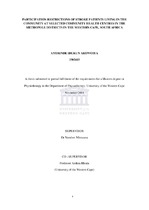| dc.description.abstract | Stroke is the second leading cause of death globally and the consequences on human and economic health are of major concern. The aim of this study was to determine and explore the participation restrictions experienced by stroke patients. The study populations were stroke patients living within the community in Western Cape, South Africa. A mixed methods approach was used to collect data in this study which consisted of two phases. For the first phase, the descriptive, observational cross sectional design was used to determine the participation restrictions of stroke patients living within the community and the factors associated with community with respect to integration. In this phase, an interviewer- administered questionnaire was used to collect data; the instrument for this study is the standard World Health Disability Assessment Schedule 2.0 (WHODAS 2.0) for disability assessment which includes the International Classification of Functioning Health and Disability (ICF) concept in disability assessment which has been tested and found to be reliable and valid, to determine various participation restrictions among stroke patients living in the society. While in the second phase of this study, two focus group discussions were conducted at the selected community health centre; these participants were conveniently selected from those who participated in the first phase of the study. This was conducted to retrieve in-depth information on difficulties encountered in participating in daily life situations. The Statistical Package for Social Sciences (SPSS) was used for descriptive and inferential statistics. Chi square and Anova t-test was used to determine the association between the demographics statistic and participation restrictions. Alpha level was set at 0.05. For qualitative findings, audiotaped interviews and note taken were transcribed and translated into English; the expressed ideas were coded and reduced into subthemes, themes and categories. Ethical clearance and permission to conduct study was sought, consents from participants were sought, clearly stating the right to participate and withdraw from the study was respected and anonymity and confidentiality has been ensured. The result of the study showed that participants encountered difficulty with cognition, (23.3% of participants reported severe difficulty in learning a new task; 20% reported severe difficulty analyzing and finding solution to day to day activities), mobility (34% acknowledged difficulty walking a long distance like one kilometer after stroke), self-care ( 44% indicated difficulty staying alone for few days after stroke, while the majority, 61% complaints of difficulty with getting dressed by self), getting along with people with the majority of the difficulties (36%) are sexual activities, household activities with major complaints (46.6% and 31.4%, for severity and exemption respectively) in getting needed household work done, severe difficulty (51.7%) reported in relaxation and pleasure after stroke, 50.8% been financially restrained after stroke, 40% with difficulty in joining in the community activities, 39.2% severely affected by people perception towards them and 25.8% of the participants indicated extreme time spent on health; all difficulties investigated within the society 30 days after the incidence of stroke. However, the result of the qualitative phase reported the participation restrictions experienced by the participants. Difficulty in cognition was reported, which promotes indiscipline among family members. Limitation in activity level such as in mobility (walking for a long distance, standing from a sitting position), in self-care (washing the whole body, eating, staying alone after stroke), in getting along (maintaining friendship, sexual activities), in household activities and work activities was reported. Participants experienced difficulty in joining in community activities, emotional fluctuations, poor perception of attitudes of others after stroke, excessive use of time on health conditions, increased financial impact of health condition and burden impact on family was reported. Environmental barriers such as transportation and toilet facilities were reported. The current study findings suggest appropriate and specific programmes should be aimed at improving participation among stroke survivors in the community. | en_US |

